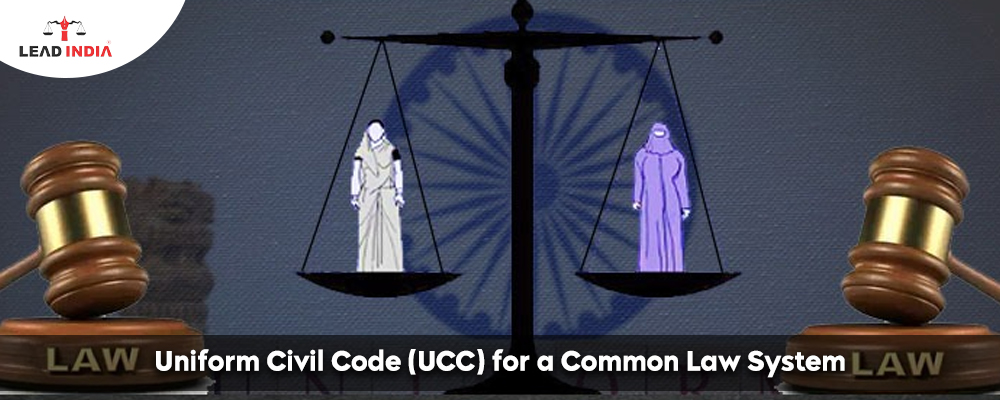The Uniform Civil Code (UCC) provides a legal framework, although it is not legally binding. It is a system of standard laws governing inheritance, marriage, adoption, succession, and divorce that apply to all citizens, regardless of religion, community, race, gender, or caste.
The Indian constitution establishes the Uniform Civil Code (UCC) as guiding principles for state governance. It means that while it is not legally enforceable, the government can always use it as a guiding principle.
Uniform Civil Code (UCC) for a Common Law System
This Uniform Civil Code (UCC) is referenced in Article 44 of the Indian Constitution as directive principles of state policy. According to the Directive Principles of State Policy (DPSP), the state must provide its inhabitants with a unified set of laws within the limits of India.
Need A Legal Advice
The internet is not a lawyer and neither are you. Talk to a real lawyer about your legal issue

The purpose of the Uniform Civil Code
The Uniform Civil Code was suggested to replace personal laws applicable to each religious community based on customs and scriptures. It refers to the execution of a single set of laws designed to govern every citizen. Currently, Hindus, Muslims, and other religious communities have different personal laws.
The importance of the Uniform Civil Code
- To promote equality: In today’s modern period, a secular democratic country like India should impose uniform civil and personal laws on all citizens. Laws should not vary depending on religion, class, caste, gender, sex, or race.
- To promote national integration: Except for these personal laws, the court must treat all Indians equally in criminal and civil matters. As a result, implementing the UCC can potentially abolish prejudice among various religious communities.
- To bring gender parity: It is well observed that practically all faiths’ laws are biased towards men. Women are typically discriminated against during succession or inheritance. UCC can promote gender equality.
- To reduce loopholes in personal legislation” Personal rules of various religions have severe concerns since they support the patriarchal notion of society. Common laws can close such gaps and biases among Indian citizens.
Arguments against the Uniform Civil Code
- Goes against the right to freedom of religion: One of the fundamental rights to which all Indian citizens are entitled is religious freedom. However, some people believe that implementing the Uniform Civil Code may violate this freedom.
- Lack of unanimity: There will be disagreement because it is ultimately a person’s morality that is influenced by their views and ideology. This factor may again make UCC implementation challenging.
- Cultural and religious diversity: India is a place where people from all cultures and religions coexist. As a result, a uniform set of laws might pose a significant threat to variety and existing unity.
Advantages of UCC
- Secularism: Implementing the UCC in India would foster secularism by guaranteeing that all citizens follow the same rules. This type of approach has the potential to remove discriminatory secularism. Selective secularism entails favoring the religious majority and minority. The UCC can uphold a fair secular norm by treating all individuals equally.
- Equality: All Indians must be treated equally, and a Uniform Civil Code allows for this. In the current situation, the personal laws of religious communities are not equal. Muslims, for example, are allowed to marry many times in India. A Hindu or Christian, on the other hand, may suffer legal ramifications for doing so. Such disparities are incompatible with our country’s concept of equality. As a result, UCC may ensure that all Indians are treated equally by enacting consistent laws governing marriage, inheritance, family problems, and property ownership.
- Gender Equality: The application of the UCC would increase Indian women’s rights and enhance their overall situation. A Uniform Civil Code would challenge outdated practices and ensure that women in today’s society are treated fairly and have equal rights.
Disadvantages of UCC
- Difficulties with religious diversity: It is difficult to establish a clear and standard set of laws for personal concerns like marriage. It is an especially difficult endeavor in India due to the enormous cultural diversity that exists throughout the country.
- Sensitive tasks: Implementing UCC will require a significant amount of time and human resources. As a result, it is the government’s responsibility to remain objective and sensitive during this process. To summarise, the establishment of a Uniform Civil Code (UCC) has the potential to improve secularism and national integrity in India. However, it has to be seen if a country as culturally varied as India can successfully apply UCC without experiencing certain consequences.
Lead India provides free legal advice, internet information, and other legal services. We provide a forum to talk with a lawyer and ask legal questions. Lead India’s solicitors can help you with any legal difficulties. Lead India’s solicitors can help you with any legal concerns. Lead India also offers free online legal help in India. In addition to providing online legal aid, Lead India allows users to ask specialist inquiries for free.





 Talk to a Lawyer
Talk to a Lawyer